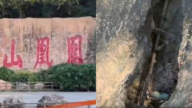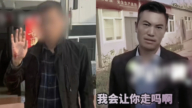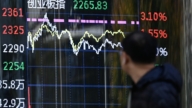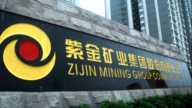【新唐人2011年8月3日讯】温州动车追尾事故后,在造成事故信号系统没有解决的情况下,“广铁集团”仍坚持将在这个月内,开通广州南至深圳北段的“广深高铁”路段。而在出事路线甬温线自恢复通车后,平均上座率就高达117.6%。学者指出:当局做法不负责任,反映了对生命的漠视。也有人认为,铁道部是腐败的利益集团,应该改制。
就在温州动车事故发生不到10天,还有遇难者没有火化,入土,铁道部已经在网站上发表:为“确保广深港高铁“高标准、高品质的服务大运会””,“广铁集团把深圳本月大学生运动会期间的铁路运输安全“作为政治任务来抓”。
“广深港高铁”的信号系统CTCS系统,与温州动车事故所在的甬温线使用同一产品,都是由“中国铁路通信信号公司”旗下的“北京全路通信信号研究设计院”设计生产。铁道部日前公开表示,已经从7月27号凌晨开始检查这一系统,“广深港高铁”也在检查之列。
“广深高铁”坚持于本月开通的消息,引来不少质疑声音。
资深媒体人高瑜认为,高铁设计本身存在技术缺陷,加上指挥系统不利,导致甬温线的事故。这种有问题的信号系统没有解决之前,仍旧冒险投入运行,这种视而不见的做法,不是一个负责任的政府所为。
高瑜: “事件没有完全调查清楚,恢复了通车,已经引起人们的愤怒了。现在为了服务一个大学生运动会,同样的研制的、同样的系统肯定令人担忧。” “ 既然这样,我认为,投入深运会,如果没有出事故也是一种侥幸。”
数年前,“日本宝塚线列车”发生重大出轨事故,仅铁轨检查一项就花了26天,至于恢复通车,则是在全部调查完成之后的55天。
学者吴祚来认为,铁道部本身是垄断的利益集团,内部问题多多,而且对生命漠视,应该改变它的体制。
吴祚来:“铁道部有很多问题,因为它是垄断,而且官营不是官营,民营不是民营,官民不分,所以应该改变铁道部,使它变成一个企业, 不应该使它变成一个由国家统包统揽的腐败利益集团。”
而对于温州动车追尾意外,中共中宣部也向媒体连下三道禁令,要求只能报导正面和官方消息。
高瑜对此认为政府能如此一手遮天,从来不考虑人民群众的意见,主要是人民没有选票。高瑜认为,全国“高铁大跃进”,背后不仅是对生命的漠视。
高瑜: “中国模式,现在是权贵需要的,是政府需要的,是官僚资产阶级所需要的,而不是人民所需要的”
知名媒体人、《中国保险报》评论主编童大焕对此表示,不应该让老百姓拿生命来磨合这种系统。
童大焕:“他们之所以仍冒险在使用,我觉得如果按照非常严格的检测的话,所有动车都得停下来,这是他们所不能承受的。”
据报导,在铁道部的大力推进下,甬温线在事故第三天(7月25日)就恢复了通车。通车后,前面两天运送旅客156253人,平均上座率117.6%,7月26号共开行动车65列,上座率138.4%。
对此,吴祚来认为,大家冒险坐高速的动车,是因为动车受到特殊的安排,而且时间上,其他火车很慢,动车很快,客观上造成了动车的拥挤。但他说,当局在事故原因没有彻底查清楚的时候,相关产品应该停止使用。
新唐人记者秦雪、宋风、萧宇采访报导。
China’s High-Speed Rails Praised
Before the rail signal system issue behind the
Wenzhou rail accident has been resolved,
Guangzhou Railway Group already announced the
opening of the section from Guangzhou to Shenzhen.
The Yong-Wen section, where the accident took place,
has had a 117.6% ridership after being re-opened.
Scholars point out that this is the government’s
indifference regarding human lives.
Some point out that the Ministry of Railways
is a corrupt vested interest group and should be reformed.
Not even 10 days after the Wenzhou train accident,
before some victims were buried,
the Ministry of Railways announced on its website,
to “ensure the high-standard and high-quality service
of the Guangzhou-Shenzhen section of the high-speed rail.”
“Guangzhou Railway Group will treat the rail’s safety during
Shenzhen’s 2011 Universiade as a political mission.”
Guangzhou-Shenzhen-Hong Kong railroad’s signal system,
CTCS, is the same system as the Wenzhou line.
Both were developed by Beijing National Railway Research
& Design Institute of Signal & Communication,
subsidiary of China Railway Signal & Communication Corp.
Ministry of Railways announced that since July 27,
they had been inspecting the signal system.
The Guang-Shen-Hong railway is also under inspection.
The announcement of the opening of Guang-Shen section
has drawn many doubtful concerns.
Veteran journalist Gao Yu believes the flaws in the
high-speed rail technologies,
combined with an inadequate signal system,
created the recent rear-end accident.
Running trains before fixing the signal system
while ignoring the glaring issues,
is not what a responsible government would do.
Gao Yu, “Running the trains before a full investigation
had already angered many people.
Now, using the same system to service the 2011 Universiade,
no doubt that would lead to some concerns.”
“It would be considered lucky if nothing happens
during the Universiade.”
A few years ago, after the Japanese Amagasaki rail crash,
Japan spent 26 days on just the rail track inspection.
55 days after the full investigation was conducted
the traffic was resumed.
Scholar Wu Zuolai believes that the Ministry of Railways
is a monopoly and interest group.
It has many internal issues, and neglects human lives.
It needs to be reformed.
Wu Zuolai, “There are many issues in the Railway Ministry,
because it’s a monopoly.
It’s a fuzzy mix of government and private enterprises.
It should be reformed into a corporation, instead of being
turned into a corrupt interest group under the government.
Regarding the Wenzhou crash, the Propaganda Department
issued threes bans to all media,
ordering them to only report positive news
and government news releases.
Gao Yu believes the reason the government can cover things
up and disregard people’s interest
is the fact that people do not have the right to vote.
Also, the “Great Leap Forward of Railways” is more than
a disregard for human life.
Gao Yu, “The Chinese model is the need of the elite,
the party and the bureaucratic bourgeoisie.
It is not needed by the people.”
Tong Dahuan, renowned journalist and review editor of
China Insurance News, says that
we shouldn’t grind human lives into the system.
Tong Dahuan, “the reason they are still running the train is,
in order to fully inspect the system with a strict standard,
they would have to shut down all the empty trains.
They aren’t willing to do this.”
It was reported that under the vigorous pushing of
the Ministry of Railways,
the Yong-Wen line resumed traffic on July 25,
three days after the accident.
The number of passengers on the first two days
were 156,253, with a seat occupancy ratio of 117.6%
65 trains were running on July 26,
and the seat occupancy ratio was 138.4%.
Wu Zuolai believes the reason people willing to ride the trains
is the special treatment received by high-speed trains.
Comparing to high-speed trains, regular trains are slower,
so there are reasons for the crowded high-speed trains.
But he believes that they should stop using the products
involved in the accident until a full investigation is conducted.
NTD reporters Qin Xue, Song Feng and Xiao Yu





























